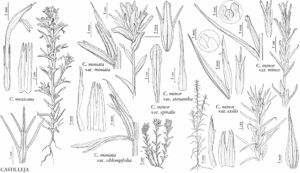Difference between revisions of "Castilleja miniata var. oblongifolia"
Bull. S. Calif. Acad. Sci. 31: 69. 1932.
FNA>Volume Importer |
imported>Volume Importer |
||
| (6 intermediate revisions by 2 users not shown) | |||
| Line 9: | Line 9: | ||
|special_status={{Treatment/ID/Special_status | |special_status={{Treatment/ID/Special_status | ||
|code=F | |code=F | ||
| − | |label= | + | |label=Illustrated |
}} | }} | ||
| − | |basionyms={{Treatment/ID/ | + | |basionyms={{Treatment/ID/Basionym |
|name=Castilleja oblongifolia | |name=Castilleja oblongifolia | ||
| − | |authority=A. Gray in A. Gray et al. | + | |authority=A. Gray |
| + | |rank=species | ||
| + | |publication_title=in A. Gray et al., Syn. Fl. N. Amer. | ||
| + | |publication_place=2(1): 296. 1878 | ||
}} | }} | ||
|synonyms= | |synonyms= | ||
| Line 30: | Line 33: | ||
|elevation=600–2800 m. | |elevation=600–2800 m. | ||
|distribution=Calif.;Mexico (Baja California). | |distribution=Calif.;Mexico (Baja California). | ||
| − | |discussion=<p>Variety oblongifolia largely replaces var. miniata from the upper elevations of the San Bernardino and eastern San Gabriel mountains in San Bernardino County, as well as the Cuyamaca and Laguna mountains in San Diego County, and it extends southward into the mountains of northwestern Baja California, particularly in the Sierra Juarez. Variety oblongifolia rarely has oblong leaves, but it differs from var. miniata in its densely puberulent stems and leaves, unusually long, narrow, acuminate calyx lobes, usually ascending-appressed leaves that are often brittle and slightly fleshy, and usually pale orange-red inflorescences. While they are occasionally found singly in populations of the nominate variety, the combination of these otherwise unusual characters is unique in var. oblongifolia.</p> | + | |discussion=<p>Variety oblongifolia largely replaces <i></i>var.<i> miniata</i> from the upper elevations of the San Bernardino and eastern San Gabriel mountains in San Bernardino County, as well as the Cuyamaca and Laguna mountains in San Diego County, and it extends southward into the mountains of northwestern Baja California, particularly in the Sierra Juarez. Variety oblongifolia rarely has oblong leaves, but it differs from <i></i>var.<i> miniata</i> in its densely puberulent stems and leaves, unusually long, narrow, acuminate calyx lobes, usually ascending-appressed leaves that are often brittle and slightly fleshy, and usually pale orange-red inflorescences. While they are occasionally found singly in populations of the nominate variety, the combination of these otherwise unusual characters is unique in <i></i>var.<i> oblongifolia</i>.</p> |
|tables= | |tables= | ||
|references= | |references= | ||
| Line 39: | Line 42: | ||
-->{{#Taxon: | -->{{#Taxon: | ||
name=Castilleja miniata var. oblongifolia | name=Castilleja miniata var. oblongifolia | ||
| − | |||
|authority=(A. Gray) Munz | |authority=(A. Gray) Munz | ||
|rank=variety | |rank=variety | ||
| Line 53: | Line 55: | ||
|publication title=Bull. S. Calif. Acad. Sci. | |publication title=Bull. S. Calif. Acad. Sci. | ||
|publication year=1932 | |publication year=1932 | ||
| − | |special status= | + | |special status=Illustrated |
| − | |source xml=https:// | + | |source xml=https://bitbucket.org/aafc-mbb/fna-data-curation/src/2e0870ddd59836b60bcf96646a41e87ea5a5943a/coarse_grained_fna_xml/V17/V17_1111.xml |
|genus=Castilleja | |genus=Castilleja | ||
|species=Castilleja miniata | |species=Castilleja miniata | ||
Latest revision as of 19:25, 5 November 2020
Herbs 2.4–8 dm; with a taproot. Stems glabrous or glabrate proximally, hairy medially and distally, hairs moderately dense, appressed to weakly spreading, short to long, soft, eglandular to sometimes stipitate-glandular. Leaves appressed-ascending, ascending, or spreading, narrowly lanceolate to narrowly oblong or ovate, slightly to moderately thickened and slightly fleshy, sometimes thin and not fleshy, margins plane, rarely wavy, flat, 0(–3)-lobed, apex acute. Bracts distally red, red-orange, pale orange, pink, salmon, or reddish magenta, 0–5-lobed; lobe apex acute to acuminate. Calyces 19–38 mm; abaxial and adaxial clefts 4–24 mm, 40% of calyx length, subequal or abaxial longer, lateral 2–12 mm, 10–25% of calyx length; lobes linear to narrowly lanceolate, apex acuminate. Corollas 28–48 mm; beak 15–25 mm; abaxial lip dark green or yellowish to whitish, 1–2.5 mm, 5–15% as long as beak.
Phenology: Flowering Jul–Sep(–Oct).
Habitat: Stream banks, seeps and damp ground in open conifer forests, roadside banks.
Elevation: 600–2800 m.
Distribution
Calif., Mexico (Baja California).
Discussion
Variety oblongifolia largely replaces var. miniata from the upper elevations of the San Bernardino and eastern San Gabriel mountains in San Bernardino County, as well as the Cuyamaca and Laguna mountains in San Diego County, and it extends southward into the mountains of northwestern Baja California, particularly in the Sierra Juarez. Variety oblongifolia rarely has oblong leaves, but it differs from var. miniata in its densely puberulent stems and leaves, unusually long, narrow, acuminate calyx lobes, usually ascending-appressed leaves that are often brittle and slightly fleshy, and usually pale orange-red inflorescences. While they are occasionally found singly in populations of the nominate variety, the combination of these otherwise unusual characters is unique in var. oblongifolia.
Selected References
None.
